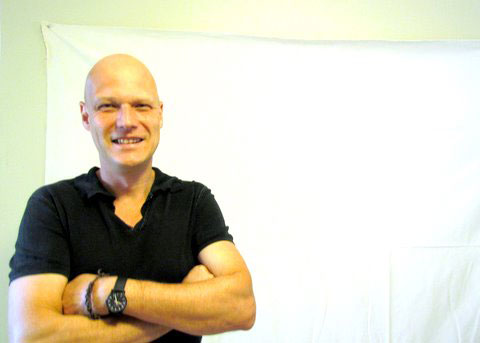… The door opens onto a living room with one wall completely taken up by white canvas … unstretched and tacked to the wall. The couch is covered with more white canvas as is the armchair … the surface of the coffee table is a rectangle of white canvas with long-stemmed red roses lying in a state of dehydration … still some color, but fading.
Mark gestures to the canvas covering the furniture and says he will use the canvas in the future. The marks from daily use and unforeseen circumstance will become part of the finished piece. I idly think of spilt red wine and black coffee … the marks of childish shoes … a charcoal drawing pencil dropped.
He has a drawing on a work table … it revolves around “borders”. Being from Belgium, borders are a reality in the lives of people. Here in the Rio Grande Valley the mention of borders elicits a passionate response. Which side of the border you are born on has a dramatic effect on your choices and the quality of your life. Everyone has an opinion on borders and immigration.
Mark has written on the drawing “standing on the borders of two totally different cultures, one side considers me a stranger … the other side considers me as different.” He is exploring the idea or concept of borders. It is poignant that he dwells in McAllen, Texas across from Reynosa, Mexico. He is here on a Fulbright scholarship for 9 months … at the University of Texas in Edinburg.
My questions, and his answers ( as best I can relate ) are as follows :
- Are you a painter? …a sculptor?… a performance artist?
“I am a painter/sculptor. Performance is an act. I perform in daily life.” - What is your definition of a successful work of art ?
“Not relevant. ” … ( at a later time he said “Art is never a winning thing, but it is knowing that and still resisting it.”* * a reference to B. Oosterlinck, Belgian artist. - What is your definition of success as an artist?
“I refuse to answer this because there is no definition.” - At what age did you know you wanted to be an artist ?
“At 18 I went to a Theater School in Antwerp. After that I went to a school for the plastic arts, which in Belgium is the Education/Social major. It leads to being a teacher. As I decided not to pursue teaching I became financially independent of my parents. ” - How have the financial uncertainties of being an artist affected you and your family?
“As an artist you can make your own choices, … but it is dangerous. Your audience can say ‘yes’ or ‘no’ which will affect the way you proceed. It is difficult to know how to manipulate this aspect of art. A person needs to understand the economy, the way to make a living, and to laugh but have knowledge. For my family, they are in a position of being surrounded by rich and poor. This is not easy for children to swing between the two and understand it.
There is also the political situation which artists need to understand. I refer you to Francis Ponge, an artist who wrote only on soap. He wrote the Book of Soap in which he analyzed the situation in which he found himself living … the society he lived in … the interactions of the community. Everyone understood his references to the ruling government which was unable to arrest him.
My description would be what it is to ride a horse … actually the horse is riding with you … to go forward or backward you must communicate with the horse … you must respect the horse … just as the artist must respect the community he works in. You do not want to be dependent … I would say you wish to be available on your own terms.”
You can see Mark’s work by visiting this link: www.markcloet.be
Finally : After this interview ( or interaction ) he asked me … now WHAT DO YOU MAKE OF IT ??
I interpreted this to mean what art work will I produce as a result of thinking about these concepts. What I took away with me was the pleasure of having met a formidable intelligence … and the comfort of knowing that he exists in my world and is working on many levels to improve it.


Leave a comment